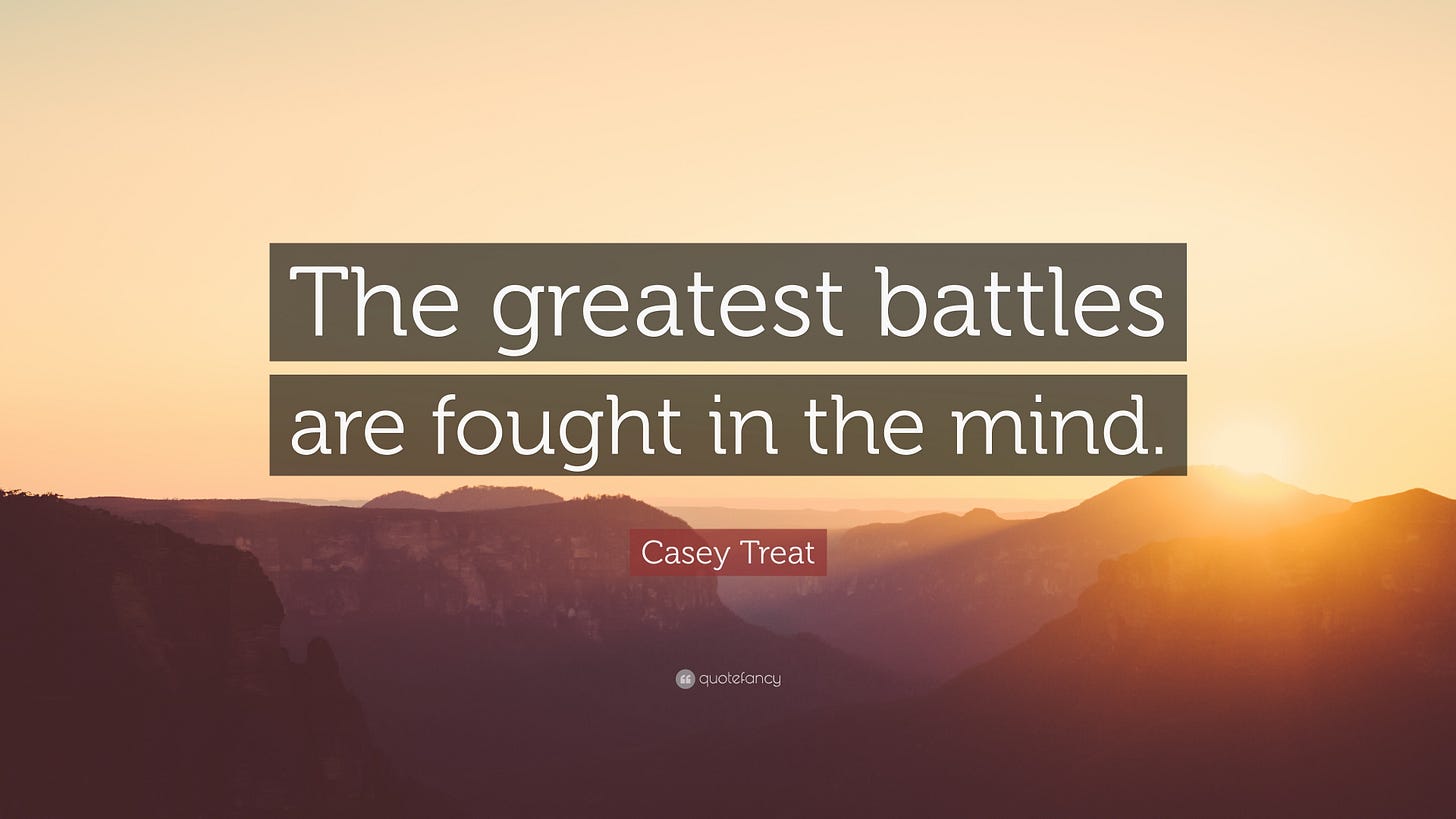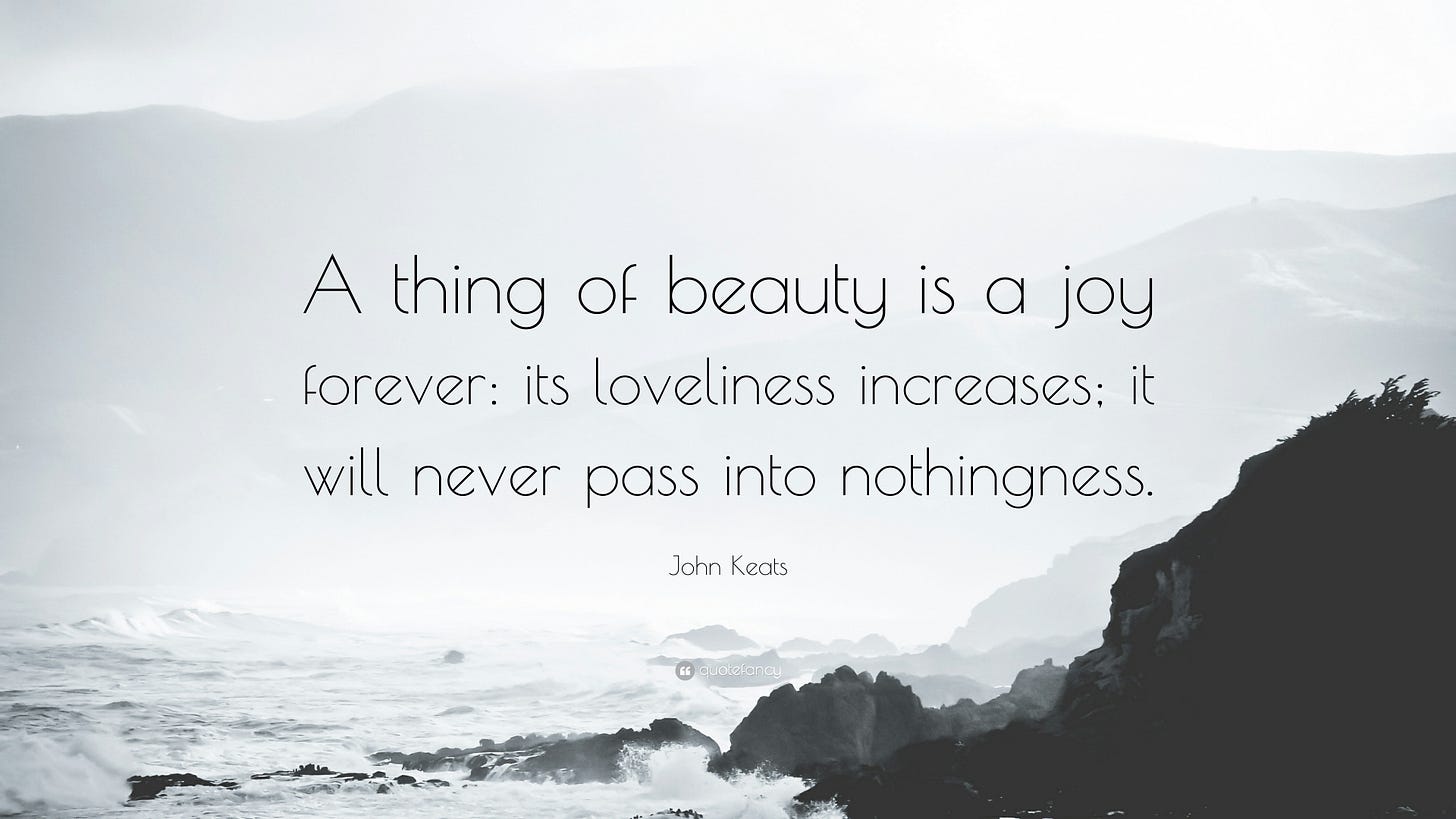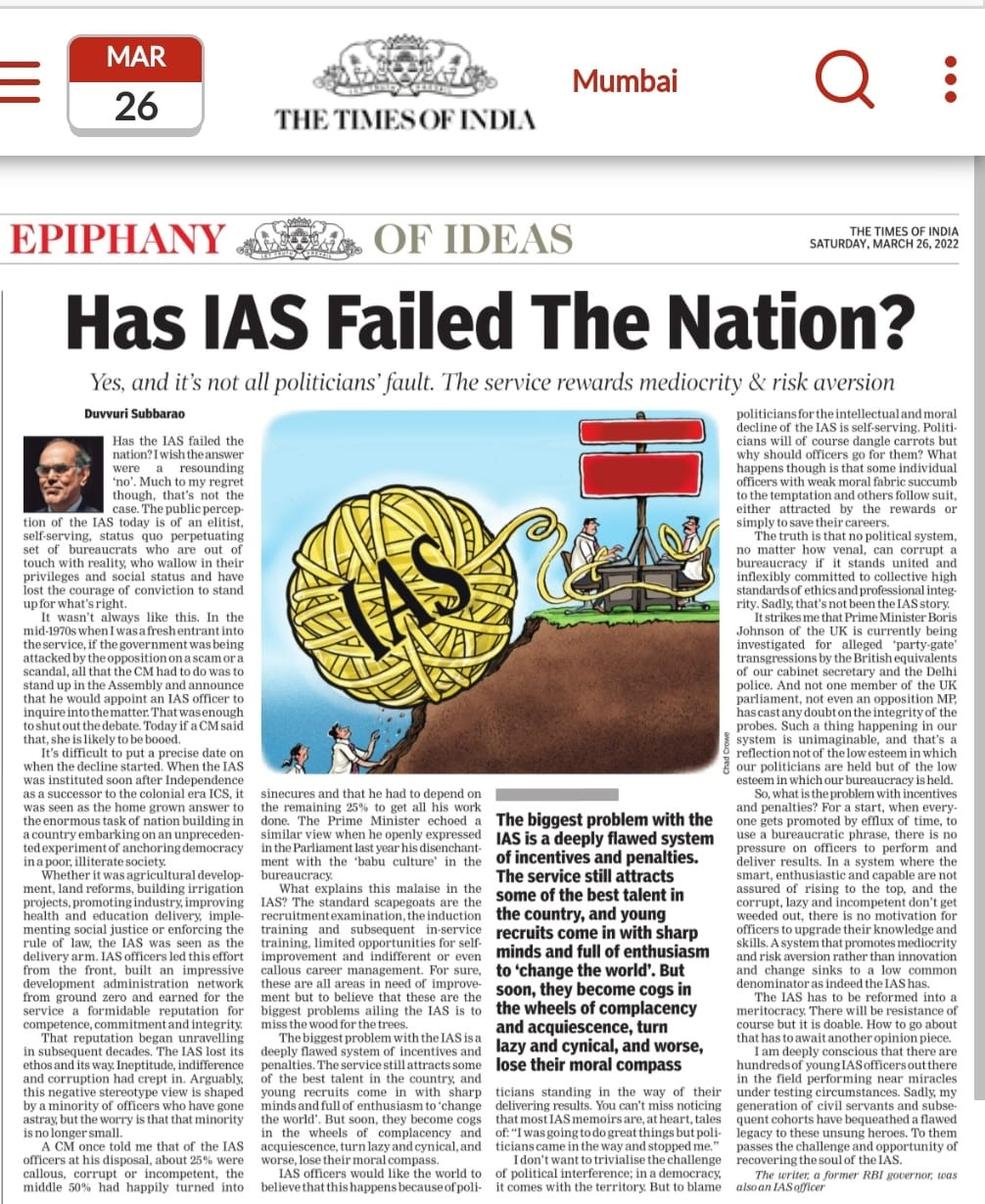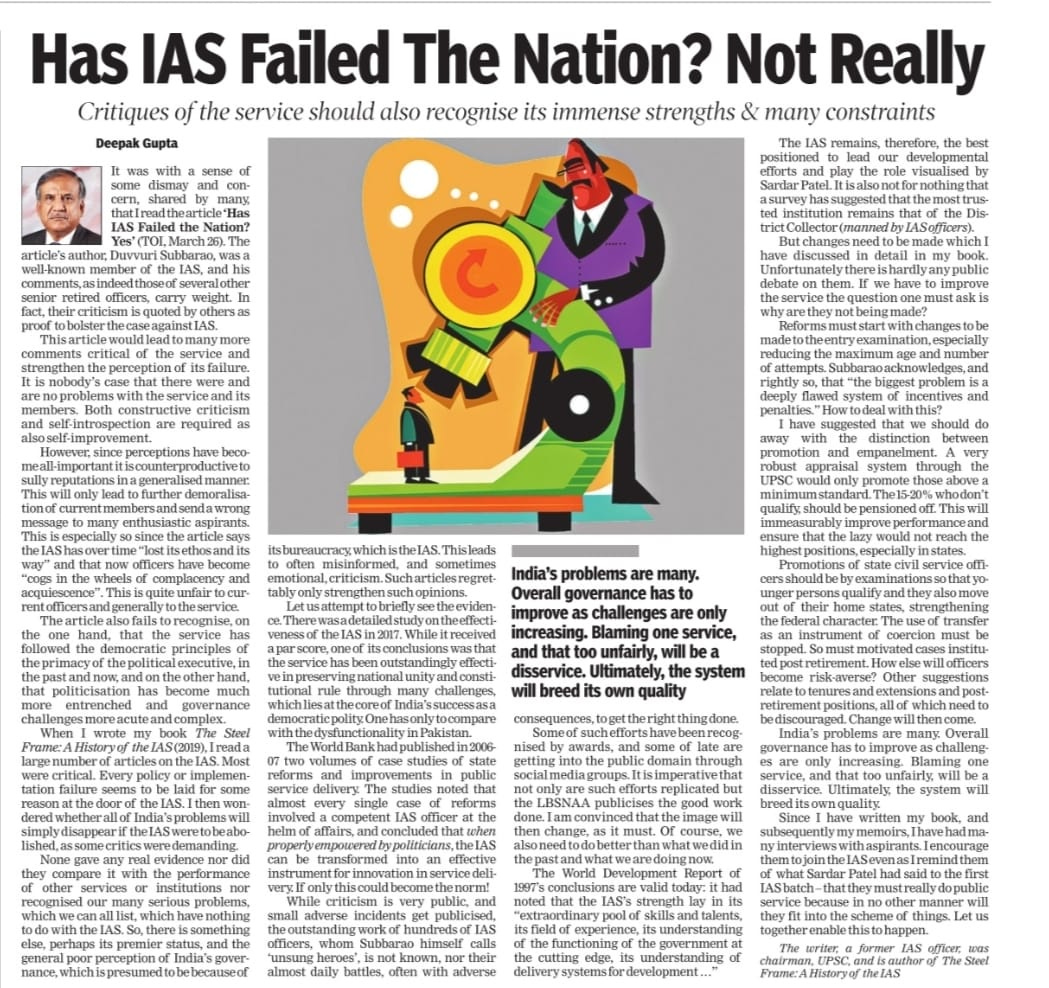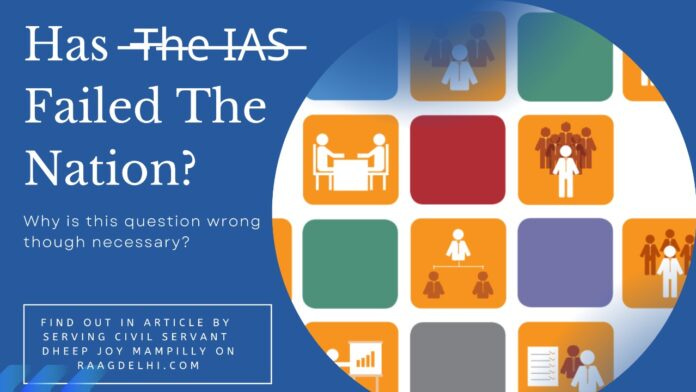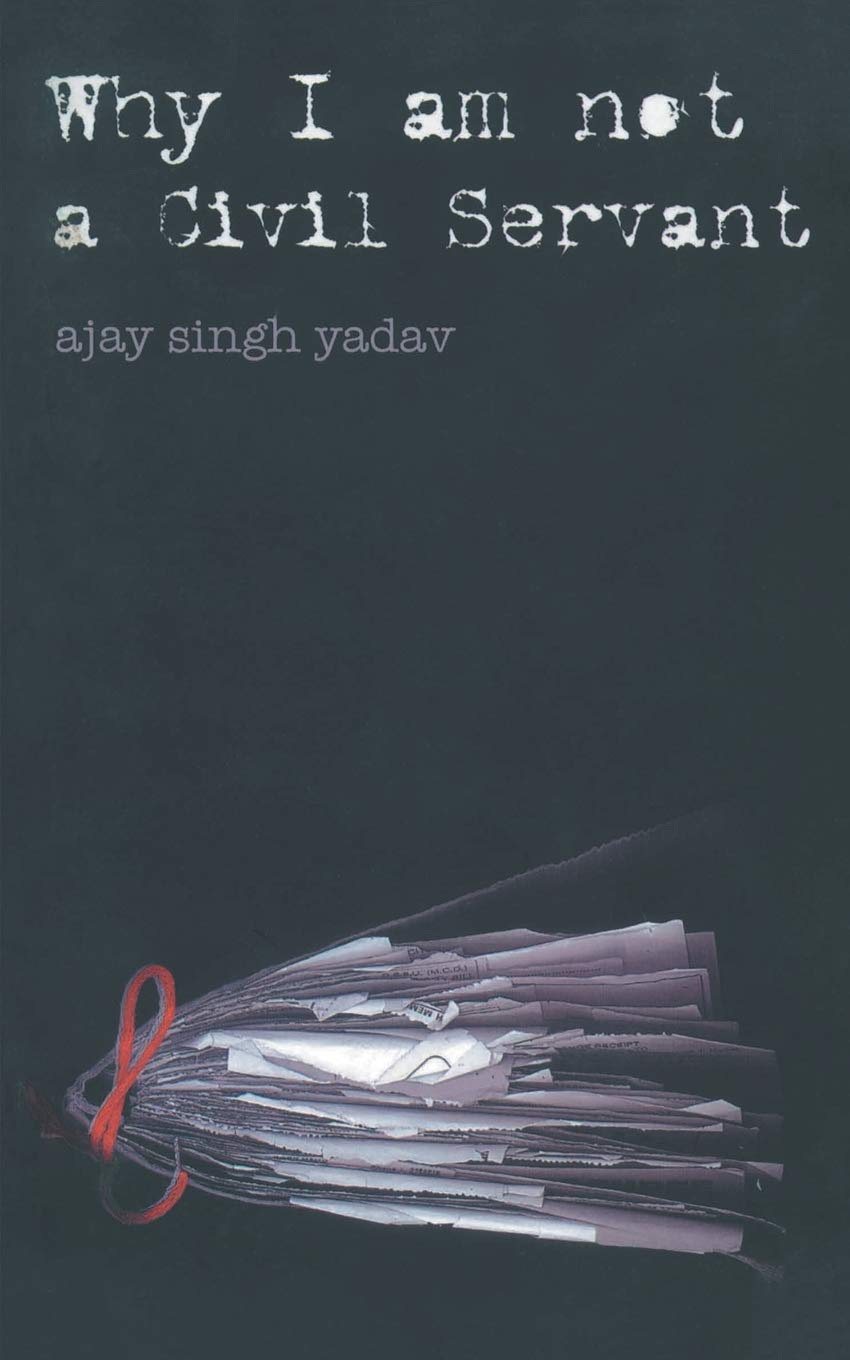#NotJust The IAS
Reflections on Why The Civil Services, more so Public Service, Is #NotJust and Should #NotJust Be About The IAS
Hello Dear,
I must confess that I am very happy now. And a large part of the reason for my happiness is due to a certain kind of victory of the mind and heart, if I may say so. This reminds me of the following quote (is this really true?)…
“The greatest battles are fought in the mind.” - Casey Treat
Either way, from a situation of feeling low and sad for a while, I have been fortunate enough to have been able to find the inspiration to find renewed hope, strength, joy and contentment. Well, compared with the tragedies, trials and tribulations which so many of our fellow beings undergo, I cannot claim to have undergone any great suffering. But then, in a sense, it is all relative, right? I think it is fair to say that, there are many occasions in our lives, when learning how the sufferings of someone else are bigger than ours, does not necessarily make us less sad about our own condition! Yes, situations could arise where we lose sight of ourselves, and forget to count our blessings.
And in such situations, we may continue to be miserable, even if, judged objectively, our sufferings pale in comparison to those of most others. But hey, the problem could very well be precisely this: that it is we who are bearing our own burdens, and since it is we (and not someone else), our judgements of our sufferings are anything but objective.
But then, we are a resilient species, isn’t it? So yes, I have been able to pull myself together, with the support of my dear ones (and books, prayer and music as well), and I am so much the happier for it.
But wait, it gets much more interesting than this. Once I was able to thus turn around and look at my situation with a new perspective, with new inward eyes, so to say, something wonderful happened.
The very source of our suffering transformed into a deep source of immense joy. 😊😊
Isn’t that a really beautiful thing, in large part because of its utter simplicity? Yes, for me, it has become a thing of joy and beauty.
“A thing of beauty is a joy forever: its loveliness increases; it will never pass into nothingness.” — John Keats
Yes, it is this transformation or metamorphosis of suffering into blessing, due to the simple act of looking at it differently, which has made all the difference to the state of my mind and heart. As I have written in an earlier One Doubt Please article:
The remarkable and beautiful thing about life, about our lives, about we human beings, about the human condition, is that we do not just go on despite all these blighting travails and what should have been paralyzing traumatizations, but we also find in these very sufferings the most unexpected and most powerful wellsprings of beauty, goodness, strength, resilience, creativity, wisdom, humaneness and divinity. It is this infinite capacity of the human spirit to rise above even infinite depths of misery which I believe is the key to our survival, our continued revitalization and rejuvenation, as individuals, communities, societies and as a species.
If this interests you, read more on this theme in the following article.
#NotJust Sufferings: Are(n't) they Blessings too?
Reflections on the age-old condition and phenomenon of human pain and suffering, and our eternal quest to find life and meaning in, through and beyond them
Let me hence take this opportunity to ask you, dear reader…
Which of your weaknesses might actually be your strengths as well?
To put it differently, are we regarding some of our qualities as our weaknesses because and only because of the way we are looking at them? I.e., due to the attitude we have adopted towards them, due to our specific perspective? Is there a possibility that these very same weaknesses could in fact also be our strengths? It could just be that we are yet to see them for what they are and could be.
To give a simple example, I am happy to tell you that I got the opportunity recently, to give to a fellow civil servant and IIS officer a certain responsibility which he was partly afraid of taking up on his own. And it is another thing of beauty and eternal joy for me, that he has #NotJust been able to do it very well, but has also become more confident in the process. 😊
This aligns perfectly well with my thinking, that each one of us should give precisely those responsibilities to our juniors / subordinates which they are currently afraid of taking up, which they think they would fail at.
Since it is only outside our comfort zone that growth happens. And it is only by stretching our boundaries that we break them and realize that none really exist.
We had discussed this in the following One Doubt Please article.
Are We Really Allowing Ourselves to Fly?
Reflections on our potential, our beliefs about our potential, and how this makes a world of difference!
So, the point I was coming to is that this officer said that he had some element of stage-fright, especially because he had not gotten an opportunity till now, to speak in front of a large audience. Now, while this may appear to be a weakness at first sight, it could also be a source of strength, in that the fear can be a force which inspires us to prepare better. And yes, with better preparation, we may be able to #NotJust conquer the fear, but even do better than if we had no stage-fright at all to begin with.
Now, here is something which you may find amusing. In exactly three weeks from now, I will have completed 12 years in the Indian Information Service, the civil service to which I belong.
Why IIS? What Makes it Unique?
Some Reflections on the Indian Information Service, on the day I complete 11 years in IIS and hence in Indian Civil Service 🙏
And here is the amusing part. For a long long time now, I have had an attitude of gratefulness for being a member of the service, and that is in large part not despite but because of the relative material deprivations which we IIS officers “suffer from” or rather, “enjoy”. 😊Let me not be more specific about what these material deprivations are or could be. And what I find to be a liberating thing about this kind of an attitude is the attitude of resilience which this spirit enkindles in us. If we are able to adopt this disposition, the more difficult the going gets, the more beautiful it gets for us, and the better we are able to march forward.
Haha, indeed, I should clarify that I have not been able to embrace this attitude all the while - which of course explains, to a large extent, the various lows I have gone through. But yes, I have been able to bounce back every time, so far.😊
Fine then, we spoke of sufferings and blessings, of the transformation of weaknesses into strengths, of flying higher, stretching further and realizing our potential, and of the joys and pains of being and becoming in IIS, or the civil service, more generally. Let us hence join these threads together and delve briefly into a theme which has resonated in my previous writings: the necessity of being, becoming and growing together.
As simple and fundamental as it is, the tragedy is that we forget it so too often, isn’t it? And should it be any surprising, when we are taught to compete and win, right from school or even before that?
So, as I near the end of the 12th year in the Indian Civil Service, please allow me to share with you an article I write in June 2022. My article was a response to articles written by two retired IAS officers.
The first article, by retired IAS officer Duvvuri Subbarao asked the question “Has IAS Failed The Nation?” (published in The Times of India on March 26, 2022). And much to the apparent consternation of many of his comrades in the IAS, the former RBI Governor answered in the affirmative, categorically stating that yes, the IAS has indeed failed the nation.
And yes, within less than a fortnight, another retired officer, this time a former Chairperson of the Union Public Service Commission, came forward to counter the audacious claims made by his colleague. Yes, Deepak Gupta laid out some arguments, as to why “blaming one service, that too unfairly” is a great disservice, and that no, the IAS not failed the nation. You can read this article here: Has IAS failed the nation? Not really: Critiques of the service should also recognise its immense strengths & many constraints.
And here is my article, written in response to the two articles.
Has the IAS Failed the Nation? Wrong But Necessary Question!
Our former President Dr. A. P. J. Abdul Kalam recounts how he learnt the best management lesson of his career. The ISRO project to launch the satellite Rohini into space failed. Dr. Kalam was the Project Director but the then-Chairman Prof. Satish Dhawan took responsibility for the failure. He addressed the press conference following the failed launch and expressed confidence in his team. The next year, when the mission succeeded, Prof. Dhawan gave the success to his team, stepping back and asking Dr. Kalam to address the press conference.
[More about this: Dr. Kalam’s address to the Students at the Satish Dhawan Space Centre, SHAR]
Why recall this incident now, in a discussion on whether the IAS failed the nation? The lesson Dr. Kalam learnt assumes relevance because of a concern, shared by many civil servants, that many in the IAS are yet to learn this simple yet fundamental lesson. And this includes not only the nobility and modesty of good leadership, exemplified in how a leader assumes responsibility, shares credit and builds others. It encompasses a more basic truth which we fear is curiously lost on more than a few members of the IAS fraternity:
We can’t do it alone, we need each other.
Yes, to do good, to accomplish anything great, to make a positive difference in people’s lives, we need the inspired contribution of our fellow brethren, most likely a lot many of them. The need for collaboration across organizational and societal boundaries has become even more vital in recent times, with increasing interconnectedness and interdependence of our world and the complexity and interdisciplinary nature of the problems we need to address. It is hence unfortunate and disconcerting to say the least, to find very many IAS officers apparently so full of themselves, demanding undue public attention and recognition, as if the world moves ahead by virtue of their will and command alone.
No doubt, numerous IAS officers have rendered and continue to render exemplary service to the nation. Needless to add that they don’t need any validation from anyone. But, as a system, the IAS seems to continue to live in a world where they are the lords, and the rest minions.
How else can the IAS continue to occupy most of the senior positions in the government, as well as in constitutional and regulatory bodies? How else can they tolerate a system which gives them differential treatment including faster career progression vis-à-vis other “non-elite” civil services? How else can they afford to talk only or even majorly about themselves and their contribution, conveniently ignoring or forgetting the numerous people from various civil services who enable them to achieve and who often do the real execution?
The IAS, significant as it is, appears to be too obsessed with itself, at least as suggested by the state of the system and by the utterances of the vocal members of the IAS fraternity. This is what is fundamentally amiss in retired IAS officer Duvvuri Subbarao’s article “Has IAS Failed The Nation?” (The Times of India, March 26, 2022) as well as in the counterpoint by another former IAS officer Deepak Gupta’s article “Has IAS Failed The Nation? Not Really” (The Times of India, April 6, 2022). Remarkably, neither article makes barely a mention about any of the numerous other civil services in the central and state governments. And thus, here itself, we have a big part of the answer to the question the two former IAS officers pose.
Having reflected on why the question is essentially wrong, let us analyse some of the arguments put forth by the two retired IAS officers.
In attempting to marshal evidence in support of the competence of IAS officers, Deepak Gupta cites a World Bank study which says almost every single case of reform involved a competent IAS officer at the helm. What great epiphany does this contain, even if true? What else is to be expected when IAS officers keep themselves at the helm of most institutions? It’s like saying that almost every successful surgeon is a medical doctor! Moreover, what about reform opportunities which the IAS failed to capitalize on? Did the World Bank study look at them as well?
Further, in an article laying claim to the superlative competence of the IAS, Gupta expresses concern that articles such as Subbarao’s which “sully reputations in a generalized manner” will demoralize serving IAS officers. But if the IAS officers are so competent and are doing good work, why does the author fear they will get demoralized by a mere opinion piece, even if it were to be followed by a decline in public trust in their competence? Are their egos so brittle, their confidence so shaky, their work ethic so vain? The question begs itself.
Perhaps most importantly, Gupta says it is unfair to blame IAS alone for our governance deficit and failures. Well, when the ship sinks, are we going to blame the sea or the mechanic, or should the captain take responsibility? Surely, the IAS can take at least some responsibility? At the same time, Gupta wants good work of IAS officers to be publicized; that’s fair, so long as it is intended to replicate and inspire the good rather than to merely change perception and massage their egos. But then, if credit is due, surely responsibility too is due.
And who else but the IAS is to blame for the blame being confined to only one service? Did the IAS bring other services to the helm who could then have shared the blame or responsibility?
Even Gupta’s article too, like Subbarao’s, is obsessed with IAS. As if others exist only to distribute or shall we say delegate blame/responsibility!
Lastly, it is important to realize that failure of the system does not necessarily mean everyone in the system has failed. The two are not inconsistent; the system may have failed despite your best efforts to reform and rescue it! And it may have failed in an even bigger way, had it not been for your contribution. As I understand it, Subbarao’s article is against the system the IAS evolved to be, not the individual IAS officers per se (though yes, many officers do arguably contribute to the decadence of the system, by acts of either omission or commission). Rather than demoralize, it should only inspire civil servants to engage in a shared reflection on their contribution, to build better systems which better amplify the collective infinite human potential of our people and better serve the oft-elusive public good.
And the need of the hour is for more enlightened and inspired people to join and be a part of failing or failed systems. After all, it is not the healthy but the sick who need a doctor. And lest we forget, that doctor need not always be the IAS. It can be anyone, including you and me. And is more often groups of people trying to create a good system, rather than simply someone meaning well, and hardly ever a self-important and self-serving lone genius. Yes, Together Everyone Achieves More; collaboration has always been and continues to be essential to create enduring meaning.
[End of the article, written by me and published originally on June 17, 2022, on the portal Raag Delhi]
Well, reading and reproducing this article now reminds me of a short piece of reflection I wrote, way back in December 2021.
More than the power-hungry politicians, it is the equally power-hungry, sycophantic, manipulative, chamaleonic, spineless, mindless, heartless, soulless and self-serving bureaucrats / glorified "civil servants" who dilute, divert, distort, compromise, corrupt and annihilate "public interest". 🙂🙏
Of course, I do not mean that all civil servants are like this! No. That said, the above lines kind of make for poignant reading, especially in light of some recent incidents surrounding the disqualification and removal of an IAS officer from the service. Here are two One Doubt Please articles which have largely been inspired from this train of events.
#NotJust An Exam
Reflections on the Himalayan Challenge of Evaluating Ethics through An(y) Examination
#NotJust Yours or Mine
Reflections on Why Our Ethics and Morality is Not Just Our Own!, and How It Can, Does and Should Evolve
And before we close, it would be fitting for our discussion to recommend the following book, written by a former IAS officer and civil servant. The book is titled Why I am not a Civil Servant, written by Ajay Singh Yadav and published in 2001.
So, that is it for now. Did you find some value in this article? Kindly do me a favour and let me know! And also consider sharing this in your social circles, if you think it could interest someone. Thank you! 😊




